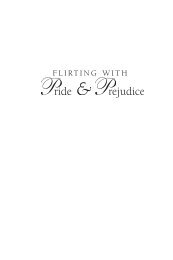Edited by Scott Westerfeld - Teen Libris
Edited by Scott Westerfeld - Teen Libris
Edited by Scott Westerfeld - Teen Libris
Create successful ePaper yourself
Turn your PDF publications into a flip-book with our unique Google optimized e-Paper software.
The Dangerous Worlds of Pullman’s His Dark Materials 27<br />
work-because it is so good and compelling-might exert undue influence<br />
over the minds and hearts of children and teens.<br />
Rupert Kaye describes HDM as “a honeyed trap,” and suggests that it<br />
be removed from every primary school in England.<br />
I disagree.<br />
Growing up, I was allowed to read pretty much anything I was capable<br />
of finishing. My mother never saw danger between the covers of a<br />
book-only opportunity. My aunt’s True Romance magazines might have<br />
been a head-turning education to a child of eight, except that certain key<br />
concepts soared right over my head.<br />
For instance, I couldn’t understand why the adults in those stories<br />
were so anxious to go to bed together. For me, bedtime brought the curtain<br />
down on the most interesting part of the day and my goal was to put<br />
it off as long as possible. Looking back from an adult perspective, I<br />
assume that I cut into a different world than my aunt when I picked up<br />
those magazines.<br />
It’s like the time in fourth grade when I gave a lecture to my class on<br />
guppy sex. My teacher’s reaction was memorable, but I didn’t understand<br />
it until years later.<br />
I first read the Chronicles of Narnia as a child, totally unaware of its<br />
Christian allegorical themes. It was an exciting story, full of interesting<br />
fantasy imagery and intelligent talking animals. The religious element<br />
lent a rich new dimension when I re-read it later on. When I was a young<br />
teenager, I read Marion Zimmer Bradley’s Mists of Avalon as a romantic<br />
fantasy, only later picking up on its feminist themes and criticism of the<br />
patriarchal church.<br />
I don’t think I was a particularly dull child. If anything, my reading<br />
ability outstripped my larger knowledge of the world and the subtleties<br />
of sociopolitical and religious symbolism. There’s a chance that all those<br />
radical ideas are festering somewhere deep inside, a suppurating wound<br />
on the soul that will one day surface, but I doubt it.<br />
As readers, we enter different worlds at different times in our lives. As<br />
an adult, I read Huckleberry Finn to my eight-year-old son-not as a<br />
searing social commentary on slavery and mid-nineteenth century society,<br />
but as a fast-paced adventure story. He read it again in high school<br />
to a different purpose. I would argue that the book he read in high<br />
school was a different book-because he was a different reader. He was



